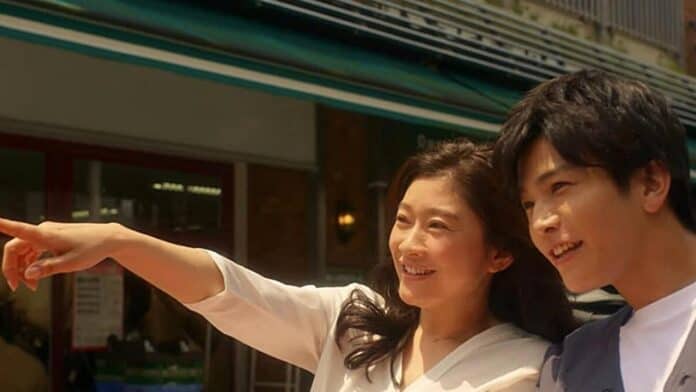Rating: 3/5
Fishbowl Wives is a Netflix series in which six women live in the same building. All women in their unhappy marriages crossroads with infidelity.
Story
Living in the same luxury building, Sakura, Yuka, Noriko, Saya, Hisako and Yuriha, all the women are in an unhappy marriage.
Sakura’s husband Takuya is unfaithful to his wife and she knows it. Despite that, they stick together as they are business partners and play house as the perfect couple. One day, Sakura comes across a goldfish shop in the neighbourhood and soon there is some tension between the owner of the shop, Haruto and Sakura.
During a heated argument, Takuya hits and assaults his wife. Sakura runs away from home and is discovered by Haruto who gives her a place to stay.
Yuka has a sexless marriage but she wishes to have a baby. She meets her ex-boyfriend and soon faces the dilemma of should and should-not.
Noriko’s husband has erectile dysfunction and only gets excited when another man touches his wife. He drags his office junior, Tsuta forces him on Noriko.
Saya and Sato used to enjoy each other’s company and loved spending time together. But work, ambition and expectations come in the way making the two look in opposite directions.
Hisako has severe migrane. She has strict principles and hates the idea of cheating. She meets Baba, a man who was kicked out of his home for cheating on his wife. The two find it hard to stay away from each other.
Yuriha’s mother-in-law is moving in at their house and she finds it hard to adjust with a dictator-like figure and her follower son. She meets a married carpenter who is renovating their house and the two have more in common than they thought.
All the women have the option of whether they wish to be faithful or not. But is staying in an unhappy marriage always the right option? ‘Fishbowl Wives’ explores their stories and dilemma.
Performances
Many may wonder why Japanese acting is the way it is. The acting might not sit well with the audience who are not very familiar with the Japanese style of acting. It’s not bad acting. Just different.
Japanese actor Kanji Furutachi explains this well.“We don’t have a good modern style, a natural acting style,” he says. “Many foreign people find acting extreme in major Japanese films. It’s ‘acting acting’”
Most of the actors in ‘Fishbowl Wives’ deliver a good performance except Masanobu Ando, who plays Takuya.
Positives
It is easily noticeable that ‘Fishbowl Wives’ is based on a manga. A few absurd concepts and themes give it away.
The show finds its heartbeat in some witty dialogues which brings a smile to the place. Dialogues like “I’ll protect you” seem like a cringe-fest but the follow up with “because I’ll say it was me who shouted” makes it refreshing.
The story explores sexuality in many different ways. It does not degrade kinks and fetishes. Just acknowledges it. The same goes for the topic of infidelity. Neither is it glorified nor is it shamed. Some of them break away from toxic relationships for a new and better life while the others decide to make their marriages work. These women have agency and write their own stories.
Stories of the women in the series seem very realistic. It could be anybody. They face problems and deal with them in their own ways. Though based on a seinen manga, ‘Fishbowl Wives’ narrates the stories of these women well. They are shown as functional beings who are capable of taking care of themselves.
Written by a team of scriptwriters filled with women, some of the characters and dialogues in ‘Fishbowl Wives’ are a necessity to be put on screen. Characters like Tsouta who asks for Noriko consent before holding her hands and her husband who forces his fetishes on her are well contrasted. Other instances like Sakura standing up for herself, Saya and Sato realising their faults and Yuka and Yuriha choosing to be unfaithful are carefully unfolded.
Sakura choosing a life on her own by herself was a little unexpected. Her excuse for leaving Haruto is unreasonable but her independence is admirable. Though it is sad to see the sailing ship drown.
‘Fishbowl Wives’ has goldfish analogies throughout all the episodes. One of the books on goldfish at Haruto’s store reads that the most important thing about the creatures is observing them. Similarly, ‘Fishbowl Wives’ may seem like erotica on the surface but a simple observation would reveal more.
Negatives
The exact things that make the drama series endearing are the exact parts that leave a bad taste.
The dialogues in Fishbowl Wives flip flops between the two extremes of charming and awkward. It’s either of the two; never in the middle.
While there are characters like Tsouta, there are people like Yuka’s ex-boyfriend Jun who forces himself on her. The saddest part is that later in the episode she goes with him happily.
The series is not devoid of traditional manga tropes like a guy putting an umbrella over the girl, a guy saving the girl and a guy slamming a hand on the wall while cornering the girl. Some parts break the stereotypes which appear in many manga series but some parts follow them like a holy grail.
Perhaps, the worst bit of all the stories in ‘Fishbowl Wives’ is Hisako’s plot. Deprived of all logic, one can see the twist for miles ahead. While most of the other parts make sense, her narrative is stupid and irrational. It’s the classic amnesia plotline. Nothing a memory loss can’t solve.
The music in the series is very repetitive. It leaves much to be desired.
Verdict
Give ‘Fishbowl Wives’ a watch if you enjoy a drama series based on reality. Keep in mind that it is an erotica but it’s not all about sex.
Also Read: Fishbowl Wives summary and ending explained

